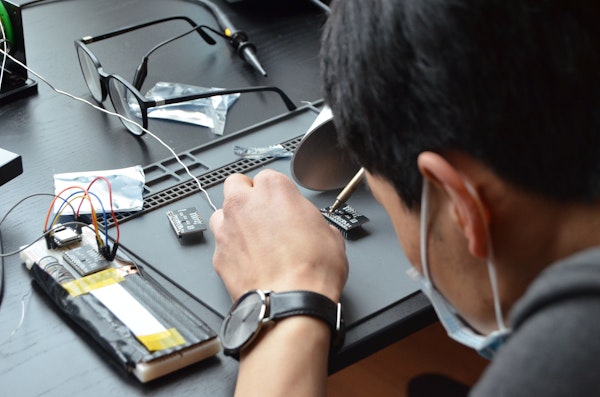Background
Doublepoint creates cutting-edge interaction technology for next generation user interfaces on smartwatches, TV’s and AR. Our smartwatch algorithms detect subtle hand gestures that have not previously been possible, but to make it work flawlessly and continuously improve, we need to employ a careful combination of both signal processing techniques, as well as machine learning techniques.
Doublepoint is looking for a Senior Signal Processing Engineer to join our Algorithm Team. The team’s goal is to create our core product, the algorithm. And your role is to understand, implement, and evaluate signal processing techniques throughout our algorithm pipeline.
Role and Responsibilities
As a team member, your responsibilities will likely include some of the following:
Form a good understanding of the sensing principles for the gestures of interest. This includes understanding factors (anatomical, environmental, sensor related, etc...) that influence signal discriminability and model performance.
Define, code and validate pre-processing and post-processing pipelines, to clean data, extract effective features for our models, and adjust tune model outputs for different use cases.
Create visualizations to help the team and other stakeholders understand datasets, signals, and model predictions.
Implement and evaluate baseline gesture detection algorithms to compare against machine learning models.
Develop ultra-low-power adaptations of algorithms, balancing energy efficiency with minimal impact on performance.
Implement traceability and security into our algorithms for deployment on edge devices and resource constrained environments.
You will also be working with others in the following areas:
Collaborate closely with other ML engineers in your Algorithm team to make well-informed improvements to our model accuracy, efficiency and transferability.
Driving the work with the Hardware Team to determine sensor limitations and formulate new sensing modalities to enhance gesture recognition.
Contribute to defining the exact gesture that results in both the best user experience as well as produces a distinguishable signal for our models.
Skills
The candidate we are looking for must possess:
5 or more years of signal processing experience, ideally in a real-time application in a user-centred environment.
Deep understanding and a proven track record with digital signal processing (DSP), including filtering, spectral analysis, time-series decomposition, transfer functions and feature extraction.
Strong software engineering skills in C/C++, and Python (NumPy, SciPy).
Experience with machine learning, working with large datasets and cloud compute.
Our ideal candidate would also possess:
Familiarity with IMUs, PPG’s, their working principle and signal characteristics.
Familiarity with embedded electronics and processor architectures such as ARM Cortex M4.
Familiarity with various human computer interaction technologies.
Qualities
The other qualities we are looking for include:
Strong collaboration skills to work effectively with ML and MLOps engineers.
Keen attention to detail to ensure high-quality data and features.
An analytical mindset with a focus on understanding and explaining clearly the underlying physics of sensor data as well as core signal processing concepts.
The ability to foresee problems in advance based on experience and intuition and act on them effectively.
High agency including taking initiative, owning challenges and one’s failures, and consistently delivers impactful solutions with minimal oversight.
Keywords
Digital Signal Processing, Algorithm Engineer, Machine Learning, Software Engineering, Preprocessing, Filtering, Sensors, Physiology, Biology, Anatomy, Human Computer Interaction (HCI), Biomedical Engineering
Hiring Process
Introductory Call and QnA with CTO Jamin Hu (30 mins)
Technical Interview with CTO Jamin Hu (45 mins)
Culture Interview with CEO Ohto Pentikäinen (30 mins)
Take-home challenge and review with Algorithm Team
Offer
Meet the team and get started
Perks and benefits
This job comes with several perks and benefits
Flexible working hours
Near public transit
Social gatherings
Equity package
Free office snacks
New tech gear
Working at
Doublepoint
